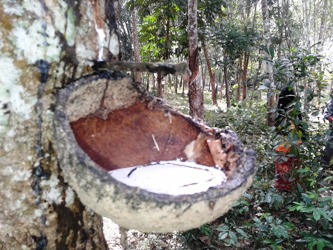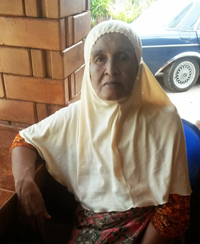Double tragedy for rubber growers in the Deep South
The steady plunge of natural rubber prices for the past three years since the peak in 2011 due to over-production and declining demand has affected rubber growers across the country, particularly in the three southernmost provinces.

Rubber growers in the Deep South have been facing a security threat from Islamic militants forcing many of them to stop tapping rubber latex altogether or switching to producing "cup" rubber by tapping latex during the daytime instead of during the early morning hours.
The price of rubber latex once peaked to more than 100 baht/kg in 2011 and has since then dropped steadily to about 50 baht/kg. The price rises since 2009 to the peak in 2011 prompted many businessmen and politicians to acquire land or even to engage in land encroachment and to turn them into rubber plantation in hope that they will reap fortunes from the attractive rubber prices.
Hence, new rubber plantations have mushroomed in the Northeast, northern and eastern provinces.
During the peak years, many rubber growers did not benefit from the high rubber prices because they were too afraid to venture into their plantations at night for fear of ambushes by the militants. Many have resorted to tapping latex during the daytime to produce "cup" rubber.
Cup rubber production process is simple. Rubber growers tap latex during the daytime which brings about less latex than tapping for latex during the early morning hours. Then the latex is left to dry up in the cup or container for 2-3 days then the dried latex are collected.
Cup rubber is now priced at 15-23 baht/kg – a sharp drop from 40-60 baht or up to 80 baht at its peak.
But for many rubber growers in the Deep South, this is still better than nothing at all.
Due to the dismal rubber prices, many families in the restive region have become more economical and spent their hard-earned money sparingly. The careful spending has affected many businesses which are dependent on rubber growers who represent the largest single group of income-earners.
Many shopkeepers and vendors have complained of poor sales of foodstuffs and consumer products after the end of the fasting month of Ramadan which is supposed to be the period that the Muslim people go on the shopping spree.
Theft cases have reportedly gone up. There were reportedly several cases of garment thievery as the smalltime thieves stole children’s clothing so that they children would have new dresses after the end of the Ramadan.
Several families have reportedly stopped their children from going to schools or changed schools to cut costs.


A rubber grower in Yaha district of Yala, 74-year old Mrs Waemeenoh Samoh, said that previously rubber growers managed to struggle through even rubber prices were much less but cost of living was low.
In the past, she said that even with low income from rubber, rubber growers could exchange vegetables or other crops among neighbours without having to buy them from the merchants "but this is not the case now because everything has to be bought."
Mrs Teemore Arwae, an 89-year old rubber grower in Yaring district of Pattani, said she used to earn 20,000-30,000 baht a month from her 30 rai of rubber plantation. The earning was shared between her and her employees who tapped the latex which was enough to make a modest living, she said, adding that now she could hardly make ends meet from the poor rubber prices.
She predicted that once she died, her children would sell off all the plantation so they would not be rubber growers like her.
---------------------------------------------------------------------------------------------------------------------------------
Captions :
1 Cup rubber in three southernmost provinces of Thailand
2 Waemeenoh Samoh
3 Teemore Arwae
